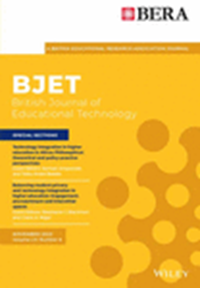Assessing implicit computational thinking in game-based learning: A logical puzzle game study
Abstract
To date, extensive work has been devoted to incorporating computational thinking in K-12 education. Recognizing students' computational thinking stages in game-based learning environments is essential to capture unproductive learning and provide appropriate scaffolding. However, few reliable and valid computational thinking measures have been developed, especially in games, where computational knowledge acquisition and computational skill construction are implicit. This study introduced an innovative approach to explore students' implicit computational thinking through various explicit factors in game-based learning, with a specific focus on Zoombinis, a logical puzzle-based game designed to enhance students' computational thinking skills. Our results showed that factors such as duration, accuracy, number of actions and puzzle difficulty were significantly related to students' computational thinking stages, while gender and grade level were not. Besides, findings indicated gameplay performance has the potential to reveal students' computational thinking stages and skills. Effective performance (shorter duration, fewer actions and higher accuracy) indicated practical problem-solving strategies and systematic computational thinking stages (eg, Algorithm Design). This work helps simplify the process of implicit computational thinking assessment in games by observing the explicit factors and gameplay performance. These insights will serve to enhance the application of gamification in K-12 computational thinking education, offering a more efficient method to understanding and fostering students' computational thinking skills.
Practitioner notes
What is already known about this topic
- Game-based learning is a pedagogical framework for developing computational thinking in K-12 education.
- Computational thinking assessment in games faces difficulties because students' knowledge acquisition and skill construction are implicit.
- Qualitative methods have widely been used to measure students' computational thinking skills in game-based learning environments.
What this paper adds
- Categorize students' computational thinking experiences into distinct stages and analyse recurrent patterns employed at each stage through sequential analysis. This approach serves as inspiration for advancing the assessment of stage-based implicit learning with machine learning methods.
- Gameplay performance and puzzle difficulty significantly relate to students' computational thinking skills. Researchers and instructors can assess students' implicit computational thinking by observing their real-time gameplay actions.
- High-performing students can develop practical problem-solving strategies and exhibit systematic computational thinking stages, while low-performing students may need appropriate interventions to enhance their computational thinking practices.
Implications for practice and/or policy
- Introduce a practical method with the potential for generalization across various game-based learning to better understand learning processes by analysing significant correlations between certain gameplay variables and implicit learning stages.
- Allow unproductive learning detection and timely intervention by modelling the reflection of gameplay variables in students' implicit learning processes, helping improve knowledge mastery and skill construction in games.
- Further investigations on the causal relationship between gameplay performance and implicit learning skills, with careful consideration of more performance factors, are expected.


 求助内容:
求助内容: 应助结果提醒方式:
应助结果提醒方式:


